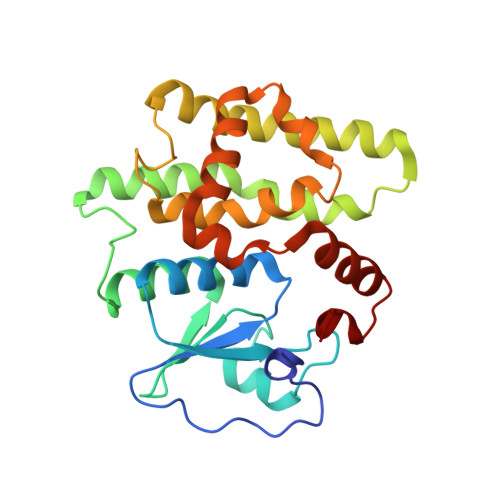GSTO1-1 plays a pro-inflammatory role in models of inflammation, colitis and obesity.
Menon, D., Innes, A., Oakley, A.J., Dahlstrom, J.E., Jensen, L.M., Brustle, A., Tummala, P., Rooke, M., Casarotto, M.G., Baell, J.B., Nguyen, N., Xie, Y., Cuellar, M., Strasser, J., Dahlin, J.L., Walters, M.A., Burgio, G., O'Neill, L.A.J., Board, P.G.(2017) Sci Rep 7: 17832-17832
- PubMed: 29259211
- DOI: https://doi.org/10.1038/s41598-017-17861-6
- Primary Citation of Related Structures:
5V3Q - PubMed Abstract:
Glutathione transferase Omega 1 (GSTO1-1) is an atypical GST reported to play a pro-inflammatory role in response to LPS. Here we show that genetic knockout of Gsto1 alters the response of mice to three distinct inflammatory disease models. GSTO1-1 deficiency ameliorates the inflammatory response stimulated by LPS and attenuates the inflammatory impact of a high fat diet on glucose tolerance and insulin resistance. In contrast, GSTO1-1 deficient mice show a more severe inflammatory response and increased escape of bacteria from the colon into the lymphatic system in a dextran sodium sulfate mediated model of inflammatory bowel disease. These responses are similar to those of TLR4 and MyD88 deficient mice in these models and confirm that GSTO1-1 is critical for a TLR4-like pro-inflammatory response in vivo. In wild-type mice, we show that a small molecule inhibitor that covalently binds in the active site of GSTO1-1 can be used to ameliorate the inflammatory response to LPS. Our findings demonstrate the potential therapeutic utility of GSTO1-1 inhibitors in the modulation of inflammation and suggest their possible application in the treatment of a range of inflammatory conditions.
Organizational Affiliation:
John Curtin School of Medical Research, Australian National University, Canberra, ACT 2600, Australia.
















